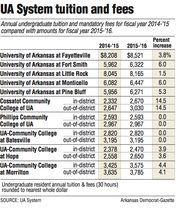BATESVILLE -- Tuition and mandatory fees for the average in-state student will increase by more than $300 yearly at five University of Arkansas System campuses under rates set Thursday by system trustees.
Starting this fall, the University of Arkansas at Fayetteville -- the system's and state's largest university -- will see such costs rise to $8,521, up $313 for students enrolled in a typical schedule of 30 semester hours spread over two semesters.
Tuition and mandatory fee increases for in-state students at the University of Arkansas at Fort Smith (to $6,322, up by $360), the University of Arkansas at Monticello (to $6,447, up by $365), and the University of Arkansas at Pine Bluff (to $6,271, up by $315) were approved.
Among UA System community colleges, only Cossatot Community College will see an increase over $300, with tuition and mandatory fees for typical schedules going to $2,670, up $338 for in-district students and a similar increase for out-of-district students.
At the system's other four-year institution, the University of Arkansas at Little Rock, in-state students will see a more modest increase, to $8,165, up $120 yearly and reflecting a fee increase but no rise in tuition.
"The cost for the average Arkansan, when we are 49th out of 50th in per-capita income, is something I think we all need to be concerned about, and I know that we are," UA System President Donald Bobbitt told trustees before they voted unanimously to approve the rates.
Bobbitt said that "there are many, many needs on our campuses," but also acknowledged the "national conversation" about college affordability.
"We're balancing here the needs of Arkansans, the needs of our campuses and, really, the political realities of this national conversation that I mentioned," Bobbitt told trustees.
Documents prepared in advance of the meeting included brief descriptions of financial challenges for each campus. UA-Monticello and UA-Pine Bluff described plans to use funds from increasing tuition and fees to boost salaries by 1 percent for all employees; UA-Fort Smith noted that the campus before the increase ranked ninth out of 10 four-year institutions in the state in terms of total annualized tuition and fees. At Cossatot Community College, students will begin a textbook rental program and employ free course materials in approximately 65 percent of classes.
Over the long term, however, the increases highlight the rapid increase in tuition and fees over the past 15 years. In-state tuition and fees have more than doubled since 2005 at UA-Fort Smith and more than doubled since 2004 at UA-Little Rock. They have more than doubled since 2002 at UA-Monticello, more than doubled since 2001 at UA-Fayetteville and more than doubled since 2000 at UA-Pine Bluff.
Nationally, the numbers are similar, according to the National Center for Education Statistics. On average, four-year public institutions almost exactly doubled their tuition and fees from the 2002-03 academic year to the 2012-13 academic year. On average, tuition and fees were $4,046 in 2002-03. By 2012-13, they were $8,070.
For UA-Fayetteville, the 3.8 percentage total increase includes a 3 percent tuition rise, with the university's facility fee increasing to $12 per credit hour, up by $2. The fee -- among the most costly of its kind in the state -- goes toward building, renovation and stewardship projects.
UA-Fayetteville officials earlier this year proposed that the increase for the next five years. By 2020, it would more than double, according to this plan.
UA-Fayetteville out-of-state students -- which in recent years have made up roughly half of UA-Fayetteville's freshmen class -- will see out-of-state tuition costs rise by 7.5 percent. Though UA offers some scholarship awards that lower the rate for out-of-state students, the standard out-of-state tuition cost will be $677.73 per credit hour, up from $630.45.
"We're very mindful of increases, the impact on students and their families, and at the same time the need to have adequate funding for our institutions so that we can provide the quality education that is expected of us across the entire system," said Ben Hyneman, chairman of the board.
Metro on 05/22/2015
